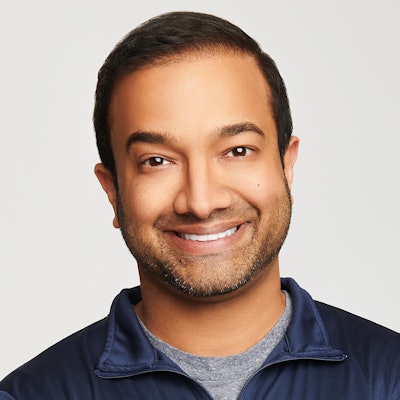
One of the stories all dental practices and personnel will be talking about in 2020 is how Walmart continues to spread its roots into healthcare and dentistry. The first-ever Walmart Health center opened in Georgia last September, and the second opened at the end of January in Georgia as well. More sites will be opening in state this year.
Helping lead the vision for Walmart Health and this growing venture is Roshan Parikh, DDS, as head of dentistry. His role with Walmart was first made public in Group Dentistry Now.
He is the founder and former president of a private equity-backed midsized dental support organization (DSO) based in Chicago. He has been ingrained in the industry since that time, becoming known as "Dr. Ro" by many. He is someone who knows how to grow a business (that one Chicago DSO is now a dental force in Chicagoland with a network of more than 20 multispecialty dental group practices with nearly 75 dentists and dental specialists) and also someone who can clearly and passionately articulate his vision.
A proud graduate of the University of Illinois at Chicago (UIC) College of Dentistry, he also obtained a Master of Business Administration (MBA), with dual emphases in finance and marketing from Loyola University.
Just after the second Walmart Health opened, Dr. Ro was kind enough to spend some time with me talking dentistry (as well as commiserating about the underwhelming 2019 season put together by the Chicago Bears). His vision for what Walmart Health's venture into dentistry will be and how it will impact communities are things that all in the dental industry need to hear.
Here's our Q&A session with Dr. Ro on Walmart Health, dentistry, and how this will affect you and private practices.
Kevin Henry: What made you interested in this position with Walmart?
 Roshan Parikh, DDS.
Roshan Parikh, DDS.Dr. Ro: My previous DSO/healthcare experience helped train me in understanding the complexities of a multispecialty group and also management by metrics. Now, however, the intrigue is that Walmart wants to take retail healthcare and turn it on its side, and truly focus on convenience and quality for the long-term. The change and impact that we can potentially have on the American population will be palpable, and, I can honestly say, it's a once-in-a-lifetime opportunity with a team that I am blessed to be a part of.
To use a quote from Confucius, "If you choose a job you love, you'll never work a day in your life." I can tell you that the Walmart Health culture and mission are things that make me jump out of bed every morning. What better mission for a healthcare provider (like myself) than to help the American public get healthier and more affordable access to quality healthcare?
With the goal of making Georgia the access-to-care example of the U.S. over the next year, what kind of logistical research did Walmart do to help make that goal a reality?
We built a full-scale model in Bentonville, AR, along with surveying 25,000 Americans regarding what they thought were opportunities for improvement from today's existing healthcare models. We wanted to make sure we got this right. Walmart Health also has an amazing online app where patients can register for appointment, input insurance information, and get an estimate for services -- all in less than five minutes.
The overarching Walmart Health mantra is "We provide moments of care for everyone, everywhere." The goal is to provide an excellent patient experience, which also provides ease and convenience. Walmart is serious about changing what access to care really looks like or what Americans think of care.
At the opening ceremony for the first Walmart Health on September 13, 2019, Dr. Oz was one of the keynote speakers. He said that he talks to 2020 presidential candidates who tell him that the No. 1 thing on America's mind is affordable healthcare and how rising healthcare costs are just getting out of control. He said the No. 1 question that he gets asked is why dentistry is so unbelievably expensive. That was pretty profound. What are your thoughts?
There is no question that many Americans don't have the income to spend on services like dental care. That issue is present in every conversation at Walmart Health, which is why quality dental services are an important element of the integrated care model in Walmart Health.
When Walmart was looking at various healthcare data, it looked for studies that, using its Walmart Everyday Low Price (EDLP) transparent pricing model, would illustrate how many more Americans would have access to healthcare as the price point dropped. Sadly, that healthcare data study does not exist.
What does exist in many forms are studies regarding how healthcare systems and group practices, if they were to raise prices, how much of a price increase Americans can take and still have access to treatment. The net of that is the notion that consolidation of healthcare systems (including DSOs) means that, over time, Americans will just be paying more and more for healthcare.
To put that into perspective, from 2004 to 2014, the average American wage has risen by 32%, while insurance deductibles have risen by 256%, or eight times that of the American wage.
The team at Walmart Health will have to fight stigmas sometimes associated with the Supercenter, right?
Walmart saves the average American household $2,500 a year on the retail side. The overriding mission is to help Americans save money, so they can live better. And, we are evolving live better to also mean live healthier by helping Americans have this kind of access. The integrated care model at Walmart Health allows providers to focus on treating the patient and providing quality care, so we're attracting good, strong clinicians. We are using digital scanners, cone-beam CT, all-ceramic restorations, and every bell and whistle that you can imagine. The goal over time is to provide orthodontics, dental implants, and other specialty procedures.
In terms of dental medical integration, what will it look like in reality? Is the practice management completely integrated?
Yes. After you are helped in the lobby, you enter the patient care area, which has rooms and space for everything: medicine, behavior health, dentistry, vision, etc. The computer system is seamlessly integrated and HIPAA-compliant. That allows us to step back and look at the entire human being, not just one part of the patient.
This year, Walmart has plans to build a handful of health centers in Georgia. Are you concerned with filling all of them?
The health centers will fill themselves. That is not a problem. Walmart serves 160 million customers per week. Our Dallas, GA, facility has been open for four months, and the practitioners are servicing a full schedule of patients with great feedback from the patients and community.
In this "test and learn" environment, we looked at what we needed in the two sites. The Dallas facility is about 10,000 sq ft. The second one in Calhoun is about 1,500 sq ft smaller. We learned from the opening of the first Walmart Health what was needed and what could be streamlined; our goal is to get patients seen and cared for, so we made the lobby smaller. In our strive for continuous improvement, we learned quite a bit from our first health center, and we took those learnings and improved our Calhoun center to continuously look to optimize patient experience.
What are Walmart Health's long-term goals?
Building quality relationships and provider interactions while providing affordable, accessible care for patients and their families. As these relationships grow over time, they will morph into patients coming in again and again. As we continue to learn what the communities need, we could see cosmetic procedures, clear-aligner therapy, and more. This is truly a long-term strategy, akin to how a typical dentist in the 1980s would hang up their proverbial shingle and build a practice.
We also want to learn how to best optimize referral patterns across the different modalities of medicine. We're building training modules on that. It is really important because it emphasizes Walmart's overall convenience philosophy, money value, quality, and time concept. For Americans, the most precious resource that they have is time. How do you make it that physicians are all calibrated to recognize things that they should be looking for? How do they learn from each other?
In dental, we're pretty isolated, so this is especially exciting for us. Dentists are learning in school to understand the mouth is the gateway to the body. They're taking more of a medical approach to dentistry, and Walmart Health is probably one of the first times they will get to use that experience.



















